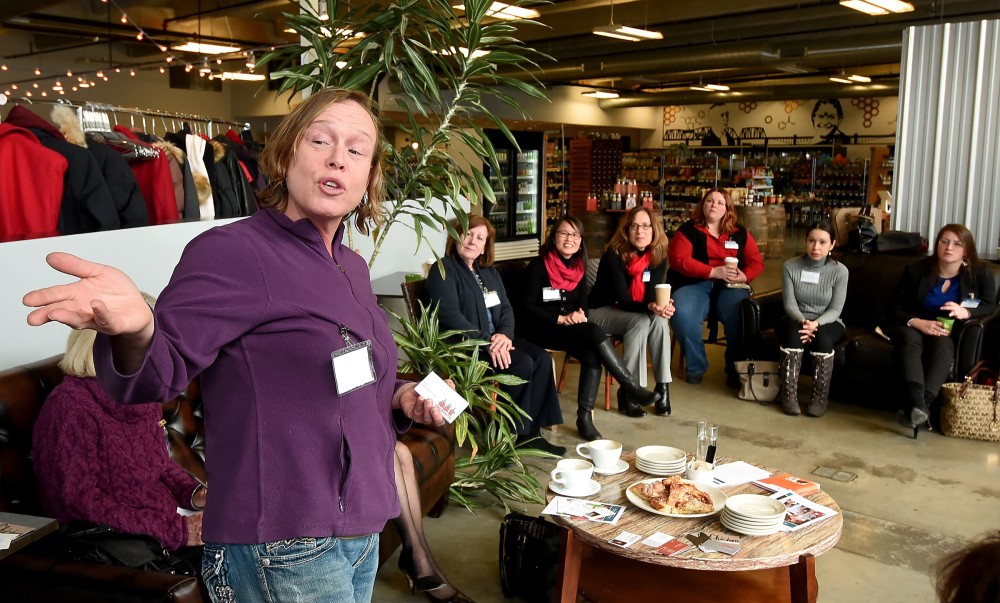By Joyce Gannon
Pittsburgh Post-Gazette.
On a morning last week when the temperature dipped to 5 degrees, Diane Danforth wasn’t a bit rattled by the weather when she showed up at Marty’s Market in the Strip District to talk about pet tags.
After spending nearly a decade working in financial services for Wells Fargo in California, and managing consumer brands including Tylenol and Sudafed for health giant Johnson & Johnson in Philadelphia, Ms. Danforth for the past year has been back in her hometown using her marketing and sales savvy at a fledgling startup — pawdentify — that makes colorful, plastic pet identification tags and collar connectors.
Despite her experience at Fortune 500 companies — and though she has business in her genes as the granddaughter of the late Douglas Danforth, who once chaired Westinghouse Electric and a partnership that kept the Pittsburgh Pirates in town in the 1980s — Ms. Danforth, 32, said she needs all the help she can get with social media, legal and accounting issues.
Not to mention needing feedback.
There are only three employees at her firm. The founder, who happens to be her father, Doug Danforth Jr., lives and works in Kansas City, Mo.
That’s why Ms. Danforth, who lives in Wexford, was among 16 women who gathered for coffee at the start of a bitter-cold workday to share anecdotes, struggles and even some successes they’ve had as owners or managers of small businesses.
The networking event is sponsored by Chatham University’s Center for Women’s Entrepreneurship and rotates monthly to different venues in and around the city.
Often the coffee shop owners are themselves female entrepreneurs.
“I’ve gotten perspective that the entrepreneurial challenges I encounter are not unique so I don’t feel alone,” said Regina Koetters, owner and founder of Marty’s Market who was hosting the coffee hour. It was only days before she announced her farm-to-table grocery and restaurant would shutter its doors after three years in operation.
Ms. Koetters wouldn’t confirm the pending closure that day but hinted at the problems Marty’s Market was having attracting patrons and employees.
That morning, she provided the group with steaming mugs of coffee, almond croissants and alternative gluten-free pastries as they sat in a cozy section of the market near huge windows facing Smallman Street.
While those in the circle had diverse businesses ranging from design to nonprofit consulting, logistics, real estate, and a digital app for physical therapy, the opportunity to exchange information in an informal setting provides a way to spark new ideas about how to respond to consumers, said Ms. Koetters.
“I’m informally running into women who can mentor me, even if it’s just in the moment.”
The number of women-owned businesses in the U.S. jumped by nearly 28 percent, from 7.8 million in 2007 to 9.9 million in 2012, according to the U.S. Small Business Administration.
Women-owned enterprises are more likely to be underfunded than other businesses, said a study by the National Women’s Business Council. That report said women-owned businesses had a survival rate of 45 percent compared with a rate of 55 percent among businesses overall.
The Chatham Center for Women’s Entrepreneurship, which offers business consulting, workshops, a speakers’ breakfast series and other assistance for female entrepreneurs, launched the morning coffees in August 2014.
Annual membership in the center, which includes the coffee meetings, other networking events, consulting sessions and discounts on educational programs, is $175.
In addition to visiting places that specialize in caffeinated beverages, the group has convened at nontraditional venues like The Beauty Shoppe, a shared office and meeting space in East Liberty; and Treasure House Fashions in Ross, a nonprofit resale shop that uses proceeds from its sales to help women in crisis or transition.
By chatting over coffee rather than presenting PowerPoint slides or sales reports, the women “establish personal relationships and create value,” said Robert Graham, a former executive with Alcoa and private school fundraiser who now is an executive-in-residence at the university who teaches MBA students.
Though businesses are increasingly driven by digital technology, he said, “At some point you are face-to-face with people and hopefully [people] won’t lose sight of the relationship side of things.”
Also mixing with the entrepreneurs was Karan Waigand, an economic development specialist with the U.S. Small Business Administration.
“Networking is the best thing you can do for your business,” Ms. Waigand told the group.
For Ms. Danforth, who joined the Center for Women’s Entrepreneurship last year when she returned to Pittsburgh to lead marketing and customer service for pawdentify, events like the morning coffees “have been great for connecting me and providing consulting.”
Before she moved back, she sought the advice of her grandfather — who died in June — about whether it was the right time for her to leave corporate life for a startup.
Now, she said, she often turns to the team at the center for input.
“I take advantage of that; it’s having fresh eyes.”














































































































































































































































































































































































